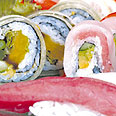


He worked at Robert De Niro’s prestigious Nobu restaurant, cooked for Bill Clinton, and today is the executive chef and one of the owners of the trendy Sushi Samba restaurant in New York.
But for Nitzan Raz, cooking is more than just a job. “It’s a daily struggle,” he says. “Each day at a restaurant is like a battle, from which I must emerge victorious.”
Raz, 33, uses military terminology intentionally. His ability to work under pressure while managing a large staff dates back to his years in the army.
“My adrenalin addiction is a legacy from the IDF,” he muses. “Today, I can’t stand it when the kitchen is calm, and everything is floating on smooth waters.”
Do you really see a resemblance between a fighter and a chef?
“In a restaurant, like in the squadron, you’re constantly being reevaluated based on your achievements. This motivates you to keep improving.”
Like every good Cinderella story, Raz’s began with a difficult basic training and ended with his conquest of the most rarified culinary heights. After he was demobilized, he pondered his next move. Meanwhile, he whiled away his time cooking with his mother, until finally deciding to convert his hobby into a career.
He chose to spend his real basic training at New York’s French Culinary Institute, one of the top cooking schools in the United States. Thus, he landed in the Big Apple with two suitcases, some pocket money and a smattering of broken English.
Raz spent a year working at the well-known Mesa Grill Mexican restaurant. “That’s where I learned all the basics: cutting vegetables, cooking methods, and mainly working under intense pressure.”
Fame followed this rough start
Twice, Raz ate at the illustrious Nobu restaurant, a top celebrity watering hole. Owned by actor Robert De Niro, Nobu offers shockingly expensive food and several isolated tables, in case Julia Roberts decides that she prefers to eat her sushi in private. Raz was suitably impressed by the Nobu dining experience and was determined to get a job at the restaurant.
“I was lucky that a position opened up just then. In addition, I offered to come for a trial period,” he recalls. “Half a year after I started, I was promoted to sous-chef. I developed the first tasting menu and invested my soul.”
What do the cognoscenti like to eat?
“Truthfully, most of them don’t exactly understand food. They order chicken in Teriyaki sauce or a regular serving of sushi. Claudia Schiffer would come a lot, and heads would turn to look at her. Not because she is famous, but because she is unbelievably beautiful. After Roberto Benigni won the Oscar, he came to the restaurant to celebrate. He stood up on top of the table, and everyone applauded him. Chelsea Clinton was a regular at the restaurant. She always came together with her friends but without a bodyguard.
"I remember that I was really excited when David Bowie came to the restaurant, because he was my childhood idol. Despite this, I didn’t approach his table, and I didn’t serve him. My encounter with Muhammad Ali, a living legend, was also remarkable. I had a slightly awkward moment with De Niro. One day, he entered the office just as I was sitting there with my legs up on the desk, feeling like I was king of the restaurant. Fortunately, he didn’t react; he just asked to use the telephone.”
The president and me
When he was asked to cook for past president Bill Clinton, Raz reached his career’s boiling point. Although Clinton is known for his fondness for McDonalds, a fundraising event at an estate in the Hamptons justified a change in habit. Raz and an additional two Nobu chefs were invited to feed Clinton and other philanthropists, in the hope that a full stomach would encourage them to empty their wallets.
“We arrived in the afternoon, in order to begin our preparations in the kitchen,” Raz reminisces. “And until we served the food at the event, several security guards stood next to us to ensure that nobody was poisoning the food. They didn’t take their eyes off of me for one second. At the end of the meal, Clinton came and shook my hand.”
Eventually, Raz felt he had accomplished all that he could at Nobu, and he decided that it was time to move on. He landed in the equally notable kitchen of Chef Jean-Georges Vongerichten. One has to wait over a month to get a table at his Jean-Georges Restaurant, but Raz was not satisfied. “I didn’t like working at the restaurant,” he notes. “I would come to work completely not in the mood.”
Israeli Samba
Just as Raz was deliberating what he should do, Shimon Boukobza, the Israeli owner of the Sushi Samba restaurant chain on the other side of the city, cooked his own dish. Boukobza, who had been following Raz’s career, invited him for dinner, and the two men hit it off right away.
Sushi Samba is one of the places to see and be seen in New York. The chain is comprised of four restaurants that offer a wide menu, which is renewed four times a year.
“It was at Sushi Samba that I first understood what a target audience is and how to cook with them in mind,” Raz says. “I was given full control of the kitchen and was required to manage an entire staff. Sushi Samba’s target audience is comprised of young, up-to-date, sophisticated New Yorkers. They are aware of what’s going on around them. You have to give them something that they can’t find anywhere else.”
About three months ago, the restaurant chain made aliyah and opened a branch in Ramat HaChayal in Tel Aviv. Raz, who returned to Israel with his wife and two daughters two years ago, supervised the new restaurant’s opening, which involved an investment of over a million dollars.
“Duplicating the menu in Israel was quite a challenge for me, since we had to import a great deal of the ingredients. We import some of the fish from New York, fly corn in from Peru, and import special chili powders from South America. We even brought the two sushi chefs in from New York.”
What is it like being a celebrity chef?
“Titles don’t interest me. I prefer to concentrate on the kitchen and not on parties. After experiencing the New York scene, not too much excites me anymore.”















